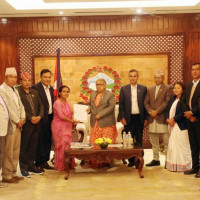- Tuesday, 11 November 2025
Sick Projects Get Axe
Nepal’s formal journey to development commenced with the establishment of democracy in 1951. The first fiscal year budget, unveiled one year later, sought to modernise the nation in a new political climate. The first five-year plan was adopted in 1956. Fiscal years’ outlays follow the economic planning and vision of the successive governments. However, our 75-year-old development trajectory bears a similar pattern - poor planning, insufficient budget, delay in disbursement owing to reduced revenues, uneven allocation of budget and dependency on foreign aid and assistance. In the last 35 years, we have witnessed other anomalies - low capital spending, political interference in the project selection, rising recurrent expenditure, poor monitoring, red tape, natural disasters and corruption. Many development projects – big and small – are hardly completed in time. Their deadlines are extended time and again, which only increases their costs, causing additional burden on the state’s coffers.
A proper feasibility study and effective project management are crucial to the success of projects. If infeasible projects are chosen, they are bound to fail, regardless of the amount of money invested in them. The tussle between bureaucrats and politicians also comes in the way of project selection and implementation. Then, it is the concerned employees and the contractors who sharply differ over several issues associated with the projects. Contractors are blamed for constructing low-quality projects such as roads, bridges and government buildings. There are many cases in which the projects are abandoned without completion. The erring contractors face the ire of local people as well as the authorities. On the other hand, contractors accuse the government of delaying the payments, which directly affects the construction works. Recurrent instability arising from the changes of governments, strikes, natural calamities and pandemic badly hit the project works.
The other day, the government decided to terminate around 234 contracts inked to construct roads and bridges as they have been abandoned for years without work. These unattended projects fall under various divisions, including the Federal Road Supervision and Monitoring Office, Postal Highway, and the Mid-Hill Highway projects, according to a news report published in this daily on Sunday. Specifically, 38 sick projects have been identified under the Federal Road Supervision and Monitoring Office, Damak, 75 in Kathmandu, 39 in Pokhara, 49 in Surkhet, 16 in the Postal Highway, and 17 in the Mid-Hill Highway. The Ministry of Physical Infrastructure and Transport, which decided to revoke the contracts, will constitute a special committee to investigate the then and current employees responsible for this situation.
Minister for Energy, Water Resources and Irrigation, Physical Infrastructure and Transport and Urban Development Kul Man Ghising said that there was no alternative to terminating contracts for sick projects to end the growing trend of contractors taking projects but failing to deliver. There has been a faulty bidding process to award the project to the contractors. Those who claim to construct projects at a lower price get them but they tend to invest money meant for projects in other commercial ventures. This not only delays the construction of projects but they are of low quality. Ghising's step is expected to give impetus to the timely construction of projects and curb irregularities that occur at different layers of government. The government should ramp up monitoring and engage the local stakeholders in project implementation.















